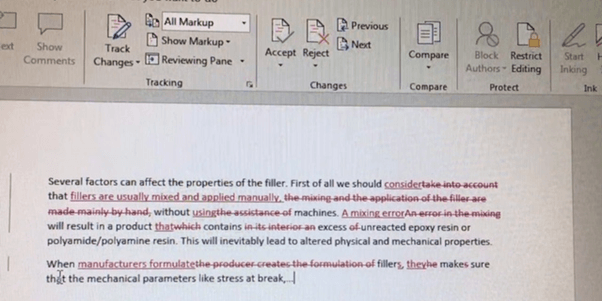When you’re a non-native English speaker and want a flawless finish
Have you ever hesitated when writing in English? Ever thought you’re not entirely sure you want to hit publish and send that post out for everyone to see because it’s not polished enough? If you’re sending a document for printing, there’s no edit function once you’ve spotted a typo and then you may have hundreds of copies to hand out, complete with errors.
It’s a vicious circle. There’s more demand than ever for content aimed at an international audience, especially if you want to grow that side of your business. You can’t send everything to be professionally translated because your budget won’t stretch to that. And given that you speak and write English so well, it makes sense to do it yourself.
But at the same time, you want to present your company in the best possible image and no matter how good your English, it’s never going to be perfect. It’s damn near impossible for a non-native speaker to strike the perfect tone whilst feeling comfortable enough to experiment and inject some personality into their writing.
I once had a colleague tell me “Oh that was right off the streets of Hamburg” as my attempt at a casual but polite email in German sharply nosedived into street slang.
Which is why I practice what I preach and get my German marketing checked. Or if I’m short of time, translated from English.
The little white lie
It just needs a quick check by a native speaker, as some of my clients like to say. Well, let’s be honest. You and I both know that it’s never actually just a ‘quick check’.
That’s the little white lie I tell my husband when something’s caught my eye in a shop window. I’ll be back in a minute, just going to take a quick look in here. Or the fib I tell my kids when they need to do homework. It won’t take long, let’s get it done now when I know it could well involve a fair amount of huffing and puffing, extra resources and a heavy dose of patience
So now we’re talking on the same level, how long will it take?
The need for speed
Depends on two main factors – text length and quality of the writing. Let’s say text A was written by someone who’s lived in an English-speaking country and text B was written by someone who’s studied English for a couple of years and has little opportunity to practice. Text A is likely to be better quality English and therefore quicker to proofread.
To give you an idea of speed, for good non-native English estimate about 1000 words an hour. It might take longer if the subject matter is very specialised, very creative or the level of English isn’t as high as expected. Or quicker if the text is straightforward and virtually flawless.
The right person for the job
As first choice, look for a native speaker working as a translator, editor, or proofreader. All of these tasks demand excellent writing skills. If you have an original in another language, a translator who offers editing services is ideal because they can check the original for clarification. Even when editing English papers written from scratch by a German speaker, I can spot Denglish at fifty paces, understand what was meant, and adapt it accordingly.
Benefits of editing
- Because your text will be improved by a native speaker, you’ll have a more idiomatic result. They’ll naturally use the words native speakers will type into a search engine so your SEO will improve online.
- Your English-speaking clients will focus on your message and not have to read a sentence twice to make sure they understood what you meant to say. It’s easy for a reader to get distracted by odd phrases.
- Your editor won’t ‘just’ quickly check over your text. I don’t ‘just’ do proofreading or editing, I want to make sure the text gets the results my clients need. I’ll check word limits, publishing, and print guidelines and rewrite a couple of sentences where necessary to fit and save hassle later on. I’ll also add useful suggestions for alternative wording as inspiration strikes.
- Save you time. No need to go back and forth between colleagues, worrying (arguing?) over a specific term. Write the words, send them off and get on with something more fun.
- Remember that street slang? Well, be as free and experimental as you like because the right native speaker will mop up any off-key remarks and polish that text to dazzle even the Queen. Or, if you prefer, your average target reader.
Sounds good but the budget is limited
You’ve written the English yourself because you can but let’s talk money – you also want to save costs. So you don’t want to fritter away your budget on an overly diligent editor poring over the perfect phrasing when it’s perfectly fine as it is. Because time is money, right?
Editors and proofreader usually charge per hour. This means that better the quality of your English, the quicker and therefore the cheaper it’ll be to edit.

Charging by hour also stops those unscrupulous people who ask for a ‘quick check’ of their text when they’re secretly sending you a machine-translated text – one that’s going to take a lot of time to rewrite, not just check and polish the odd section. Some people ruin it for everyone.
Discuss your budget and what time you want to allocate to the task before your editor starts. Agree an estimated time/budget so you know costs upfront. There’s nothing worse than getting hit with an unexpectedly large invoice.
Neither do you want to send lots of little texts one at a time and be hit with a minimum charge for each one. Bundle them together if possible or agree a number of texts with your editor for a project price. Whatever works for both parties.
What to expect when working with an editor to polish your English
You might be asked a few questions to clarify exactly what you mean. Often a tiny tweak can change the tone and meaning so better to ask first before heading in the wrong direction. You, as the author, know exactly what you want to say but it might not be clear to others.
I usually give my clients two versions. One that shows all the changes and a nice clean version that’s ready for use. The one showing the changes is not for the faint-hearted because no matter how few changes you make, all that red everywhere looks horrendous.

If you have time though, click through these changes and you’ll get a feel for the right English phrasing, and notice the kind of mistakes you make over and over. Pick those up and you’ll improve your English, making the next text better quality and therefore quicker and cheaper. Win-win-win.
Used this way, you could say that editing is like practical English teaching. With the added bonus of learning the phrases you’ll use time and again with your clients and specific to your business. But done this way you’ll avoid the teacher frowns and poor homework marks because, well, us editors are pretty nice people who want you to succeed.
If you’d rather just get to the good stuff, go straight to the pretty version that looks how you imagined your text to be. Send it out into the world and start reaping the reputation-boosting benefits and enquiries it will generate.
There you go – native-quality English without paying for translation.


